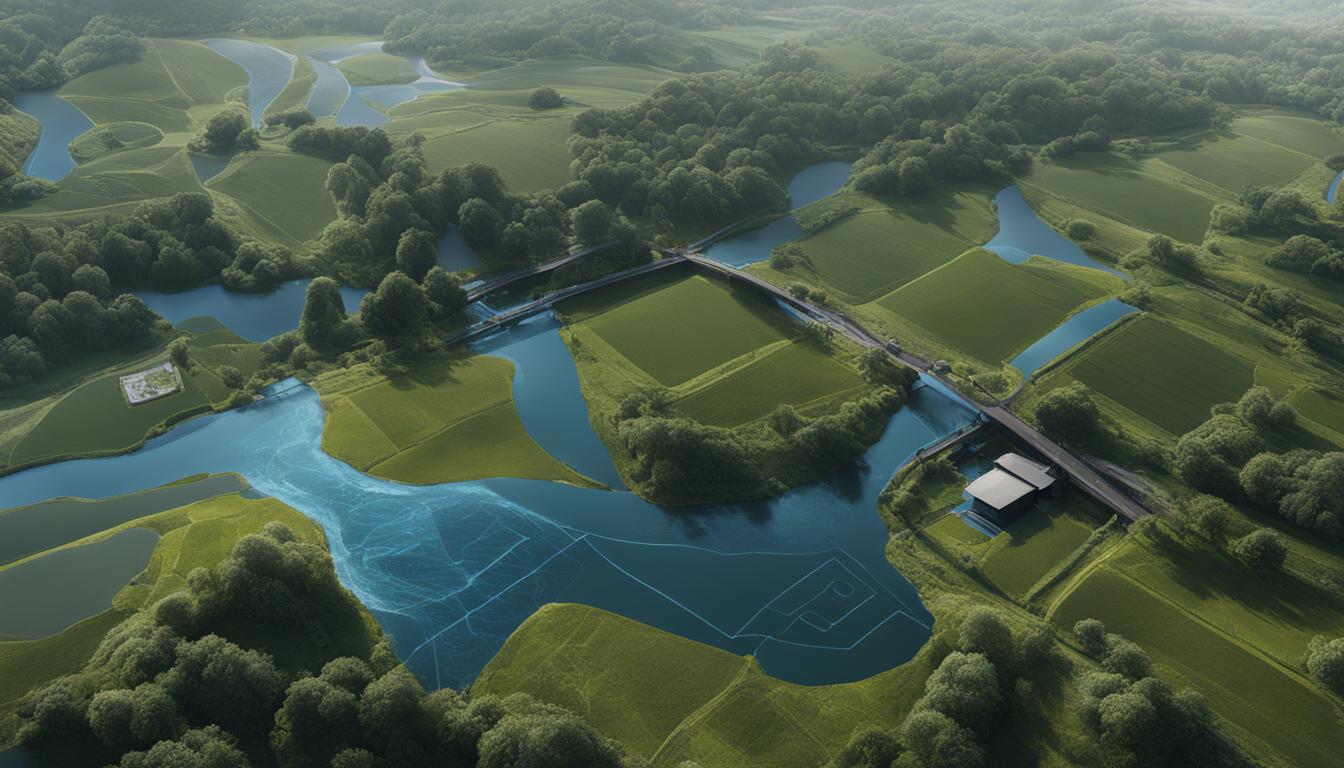Artificial intelligence (AI) has emerged as a game-changer in the field of water management, particularly when it comes to monitoring and ensuring sustainable water quality. By harnessing the power of AI, we can revolutionize the way we manage our water resources and promote eco-friendly practices.
With AI-powered systems, we can analyze vast amounts of data to monitor water usage, detect leaks, predict water demand, and optimize water distribution networks. This not only enhances the efficiency of water management but also helps reduce the environmental impact of water use.
Organizations such as the Los Angeles Department of Water and Power and the City of Chicago have already embraced AI-based systems, setting an example for the sustainable management of water resources. AI not only improves the accuracy and speed of water monitoring but also plays a critical role in detecting water pollution and alerting authorities to any changes in water quality.
As we continue to advance in AI technology, we can expect further developments in sustainable water quality monitoring, paving the way for a more efficient and eco-friendly approach to water management.
Key Takeaways:
- AI revolutionizes water management and promotes sustainable water quality.
- AI-powered systems analyze data to monitor water usage, detect leaks, predict demand, and optimize distribution networks.
- AI helps reduce the environmental impact of water use by detecting pollution and monitoring water quality.
- Organizations like the Los Angeles Department of Water and Power and the City of Chicago have already implemented AI-based systems.
- Advancements in AI technology will continue to enhance sustainable water quality monitoring.
The Role of AI in Water Waste Reduction and Conservation
AI-powered solutions are revolutionizing the efforts to reduce water waste and promote water conservation. By leveraging the capabilities of artificial intelligence, we can detect water leaks, optimize water distribution networks, predict water usage patterns, and monitor water quality with greater precision and efficiency.
One of the key benefits of AI-powered solutions is their ability to detect water leaks in real-time. By analyzing data from sensors and monitoring systems, AI algorithms can identify even the smallest leaks and promptly alert water utility authorities. This enables swift repairs, minimizing water loss and preventing further damage to the infrastructure.
AI also plays a crucial role in optimizing water distribution networks. By analyzing historical data and real-time information on water demand, AI algorithms can predict fluctuations in water usage and adjust the distribution accordingly. This ensures that water is efficiently allocated, reducing wastage and ensuring that water is available when and where it is needed the most.
Furthermore, AI-powered systems enable continuous monitoring of water quality parameters, such as pH levels, turbidity, and contaminants. By collecting data from multiple sources and applying advanced analytics, AI algorithms can detect changes in water quality, identify potential contamination sources, and enable proactive measures to ensure safe and clean water for communities.
Overall, the integration of AI-powered solutions in water waste reduction and conservation efforts brings us closer to achieving sustainable water management practices. By reducing water waste, optimizing water distribution, and ensuring water quality, AI helps us preserve this valuable resource for future generations.
AI-Based Automation in Water Resources Management
The integration of artificial intelligence (AI) in water resources management has revolutionized the way we manage, conserve, and optimize our water supply. Through AI-based automation, water utilities and organizations can leverage faster and more accurate data collection to make informed decisions regarding water use, infrastructure management, and conservation efforts, ultimately ensuring the efficiency and sustainability of our water resources.
By providing real-time insights into water usage patterns, AI-based automation helps identify areas of waste and optimize water conservation efforts. Through the analysis of large datasets, AI systems can pinpoint specific sources of water wastage, such as leaks in distribution networks or inefficient irrigation practices, enabling prompt remedial actions. Additionally, AI can optimize water infrastructure by predicting water demand and allocating resources accordingly, resulting in cost-effective and efficient water management processes.
Furthermore, AI-based automation plays a vital role in enhancing the overall efficiency and effectiveness of water resources management. By continuously monitoring water usage, quality, and distribution networks, AI systems can detect anomalies and deviations, allowing for early intervention and preventive measures. This proactive approach helps prevent water contamination, minimize water pollution risks, and maintain the integrity of water sources. Additionally, AI-based automation enables the optimization of water treatment processes, ensuring that water is purified and made safe for consumption, while also reducing energy and resource requirements.
Advantages of AI-Based Automation in Water Resources Management
- Real-time monitoring and insights into water usage patterns
- Identification and prompt remediation of water wastage
- Optimization of water infrastructure and resource allocation
- Early detection of anomalies and deviations in water quality and distribution networks
- Enhancement of water treatment processes and reduction of energy and resource requirements
The integration of AI-based automation in water resources management brings us closer to achieving efficient and sustainable water management practices. By leveraging the power of AI, we can make informed decisions, conserve water resources, mitigate pollution risks, and ensure a reliable supply of clean water for future generations.
| AI-Based Automation Benefits in Water Resources Management | Advantages |
|---|---|
| Real-time monitoring and insights | Provides real-time data on water usage patterns and enables informed decision-making |
| Identification of water wastage | Helps identify areas of water wastage and implement remedial actions |
| Optimization of water infrastructure | Predicts water demand and allocates resources efficiently for cost-effective management |
| Early detection of anomalies | Detects deviations in water quality and distribution networks for timely intervention |
| Enhancement of water treatment processes | Optimizes water purification and reduces energy and resource requirements |
Enhancing Water Quality Monitoring and Prediction with AI
Artificial intelligence (AI) has brought significant advancements to water quality monitoring and prediction. With the ability to collect and analyze vast amounts of data from various sources such as sensors, satellites, and water samples, AI-driven systems enable accurate predictions of water quality and effective identification of water contamination sources. By leveraging AI technology, scientists and engineers can enhance water quality monitoring, reduce water pollution risks, and improve water treatment and management.
One of the key benefits of AI in water quality monitoring is the real-time monitoring capability. AI-powered systems continuously collect and analyze data, allowing for prompt detection of pollution events and timely response measures. By monitoring multiple parameters such as pH levels, temperature, dissolved oxygen, and contaminant concentrations, AI can provide insights into the overall health of water bodies and alert authorities to potential pollution sources.
Furthermore, AI can optimize water treatment processes by identifying potential contaminants and predicting the effectiveness of treatment methods. By analyzing historical data and monitoring real-time conditions, AI algorithms can assist in selecting the most efficient treatment techniques to remove specific contaminants. This not only improves the overall efficiency of water treatment systems but also ensures the delivery of safe and clean water to consumers.
Detecting Water Pollution Trends
In addition to real-time monitoring, AI can detect long-term water pollution trends and patterns. By analyzing historical data, AI algorithms can identify recurring pollution events and their possible causes. This information helps authorities develop proactive strategies to prevent pollution and protect water resources. With AI-driven insights, decision-makers can implement targeted pollution prevention measures, such as implementing stricter regulations or improving wastewater treatment infrastructure.
By leveraging the power of AI, water quality monitoring and prediction can be enhanced to ensure the safety and sustainability of our water resources. The integration of AI technology enables real-time monitoring, early detection of pollution events, and efficient water treatment processes. With continued advancements in AI, we can improve our understanding of water quality, reduce pollution risks, and ensure a reliable supply of clean water for future generations.

| Advantages of AI in Water Quality Monitoring | Benefits of AI in Water Treatment Processes |
|---|---|
|
|
Sustainable Water Supply Solutions with AI
As water resources become scarcer and the need for sustainable water management grows, the integration of AI technology offers innovative solutions to address these challenges. AI-powered systems are transforming the way we manage water supply by leveraging predictive analytics, optimizing irrigation systems, and monitoring water usage. These advancements in AI technology enable water utilities to anticipate and address water shortages, reduce water waste, and promote responsible water practices.
One of the key applications of AI in sustainable water supply is the optimization of irrigation systems. By utilizing AI algorithms, water usage can be optimized based on factors such as weather conditions, soil moisture levels, and crop water requirements. This ensures that water is distributed efficiently and only used when necessary, resulting in significant water savings and improved agricultural practices.
Furthermore, AI-powered systems enable real-time monitoring of water usage, allowing for proactive detection of leaks or abnormal consumption patterns. By identifying and addressing these issues promptly, water utilities can minimize water loss and prevent wastage. Additionally, AI can help identify contamination sources by analyzing data from various sensors, enabling quick responses to potential water quality issues.
With AI-powered solutions, water utilities can optimize water distribution, improve water usage efficiency, and reduce the environmental impact of water supply. AI technology is revolutionizing the way we ensure sustainable water resources for future generations.
The Potential of AI in Water Management
The potential of AI in water management is vast, with ongoing research and development focused on improving water treatment processes, enhancing water quality monitoring, and optimizing water distribution networks. By harnessing the power of AI, we can achieve more efficient and sustainable water management practices, ensuring the availability of clean water for communities and ecosystems alike.
| Benefits of AI in Water Management | Examples |
|---|---|
| Improved water usage efficiency | AI algorithms optimize water distribution networks to reduce wastage and ensure reliable supply. |
| Real-time monitoring and detection of water quality issues | AI-powered sensors analyze water quality data to identify contamination sources and enable timely responses. |
| Optimized irrigation systems | AI algorithms optimize irrigation schedules based on weather patterns and crop water requirements. |

As the global demand for water continues to rise, AI presents an opportunity to revolutionize water management and ensure the sustainable use of this precious resource. By leveraging AI-powered solutions, we can optimize water usage, monitor water quality, and improve water distribution. The integration of AI technology in water management is a crucial step towards a more sustainable future and the preservation of our water resources for generations to come.
The Impact of AI on Water Quality and Purification Systems
Artificial intelligence (AI) is revolutionizing water quality and purification systems, offering advanced solutions for efficient monitoring and treatment. AI-powered sensors continuously collect real-time data on water quality parameters, allowing for early detection of pollution events and prompt action. By analyzing vast amounts of data, AI algorithms can predict contamination events and provide valuable insights for proactive measures.
One of the key advantages of AI in water quality management is its ability to optimize water treatment processes. AI-powered systems can analyze data on water quality, identify specific contaminants, and predict the effectiveness of treatment methods. This enables water treatment facilities to improve their efficiency, reduce costs, and ensure the delivery of safe and clean water to communities.
“AI-driven systems have the potential to revolutionize water quality monitoring and purification. By leveraging AI, we can enhance the accuracy, efficiency, and effectiveness of water treatment processes, leading to improved water quality for all.” – Water Treatment Expert
In addition to monitoring and treatment, AI also plays a significant role in enhancing the overall efficiency of water purification systems. By employing AI-powered optimization algorithms, water purification plants can optimize the usage of resources, such as energy and chemicals. This not only reduces operational costs but also minimizes the environmental impact associated with water purification processes.
| AI Benefits for Water Quality and Purification Systems | AI Applications |
|---|---|
| Early detection of pollution events | AI-powered sensors continuously monitor water quality parameters, enabling early detection of contamination events. |
| Prediction of contamination sources | AI algorithms analyze data to identify patterns and sources of water contamination, allowing for proactive measures. |
| Optimization of water treatment processes | AI analyzes water quality data, identifies specific contaminants, and predicts the effectiveness of treatment methods, improving efficiency and reducing costs. |
| Resource optimization | AI optimization algorithms help water purification plants optimize the use of resources, such as energy and chemicals, reducing costs and environmental impact. |
By harnessing the power of AI, we can significantly enhance water quality monitoring and purification systems, ensuring the availability of clean and safe water for communities. The ongoing advancements in AI technology hold great promise for the future of water management and the preservation of our precious water resources.
The Potential of AI-Powered Sensors in Water Quality Monitoring
AI-powered sensors are a game-changer in water quality monitoring as they provide continuous and accurate data on various parameters. These sensors can be deployed throughout water systems, including rivers, reservoirs, and treatment plants, to collect real-time information about water quality. This data is then processed using AI algorithms, enabling the detection of anomalies, pollutants, and changes in water quality.
With AI-powered sensors, water management authorities can receive instant alerts when water quality parameters deviate from the set standards. This allows for timely responses and necessary corrective actions to be taken. Moreover, AI algorithms can analyze historical data and identify trends and patterns in water quality, helping to predict and prevent future contamination events.
Overall, AI-powered sensors offer a proactive approach to water quality monitoring, enabling authorities to better safeguard public health and ensure the availability of clean water for all.
Conclusion
The integration of AI in water management is revolutionizing the way we understand and conserve our water resources. Through AI-powered solutions, we can achieve more sustainable and efficient water management practices, mitigating the environmental impact of water consumption.
AI contributes to reducing water waste and improving conservation efforts by detecting leaks, predicting water usage patterns, and optimizing water distribution networks. Additionally, AI enhances water quality monitoring and prediction, aiding in the identification of pollution sources and the implementation of proactive measures.
By leveraging AI technology, we can optimize water treatment processes, improve purification systems’ efficiency, and ensure the accuracy and effectiveness of water quality monitoring. These advancements in AI empower us to make data-driven decisions and implement eco-friendly water management practices.
With continued advancements in AI capabilities, we can create a healthier and more sustainable future for our water resources. By embracing AI-powered solutions, we can mitigate the environmental impact of water management, ensure the availability of clean water, and safeguard our planet for generations to come.
FAQ
How can AI help in water management?
AI can analyze large amounts of data to monitor water usage, detect leaks, predict water demand, optimize water distribution networks, and reduce the environmental impact of water use by detecting water pollution and monitoring water quality.
What organizations have implemented AI-based systems for water management?
Organizations such as the Los Angeles Department of Water and Power and the City of Chicago have already implemented AI-based systems for water management.
How does AI contribute to reducing water waste?
AI-powered solutions can detect water leaks, predict water usage patterns, monitor water quality, and optimize water distribution networks, thus reducing water waste and improving water conservation efforts.
How does AI-based automation transform water resources management?
AI-based systems enable faster and more accurate data collection, leading to better decision-making in water use, conservation, and infrastructure management. They provide real-time insights into water usage, help identify areas of waste, and optimize water infrastructure.
How does AI impact water quality monitoring and prediction?
AI-driven systems collect data from various sources to detect patterns and trends in water quality. This enables accurate predictions of water quality, effective identification of contamination sources, optimization of water treatment processes, and improved water treatment and management.
What role does AI play in developing sustainable water supply solutions?
AI-powered predictive analytics allow water utilities to anticipate and address water shortages, identify contamination sources, optimize water distribution, optimize irrigation systems, monitor water usage, and develop water-saving technologies, thus promoting efficient water allocation and sustainable water practices.
How does AI revolutionize water quality and purification systems?
AI-powered sensors continuously monitor water quality parameters in real-time, enabling early detection of pollution events. AI algorithms analyze data to predict contamination events, optimize water treatment processes, improve purification systems’ efficiency, and identify and remove specific contaminants.
How does AI contribute to sustainable water management practices?
By leveraging AI’s capabilities in monitoring, prediction, optimization, and decision-making, we can achieve more sustainable and efficient water management practices. AI-powered solutions help reduce water waste, improve conservation efforts, detect pollution sources, and enhance water quality monitoring.
- Customer Engagement and Loyalty: Innovating the Future of Saudi Arabia’s Dedicated Cargo Airline - December 23, 2024
- Regulatory and Compliance: Pioneering the Future of Saudi Arabia’s Dedicated Cargo Airline - December 21, 2024
- Financial Strategies: Fueling the Growth of Saudi Arabia’s Dedicated Cargo Airline - December 20, 2024






